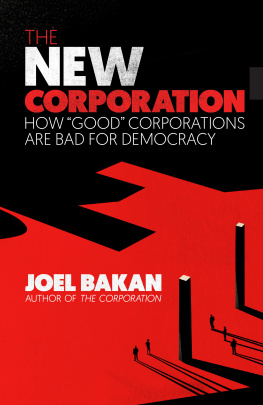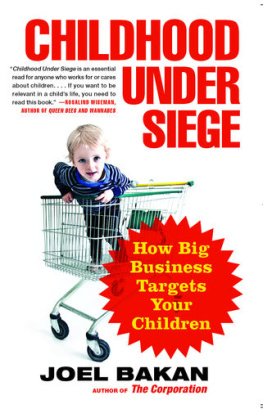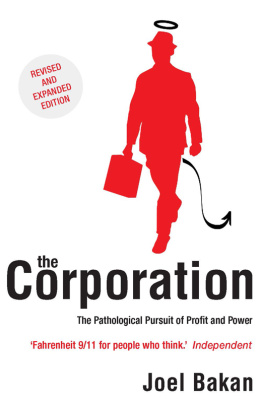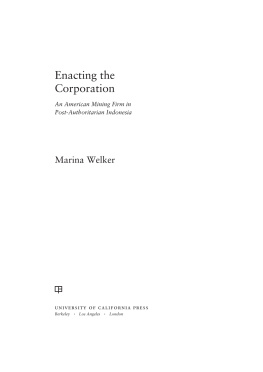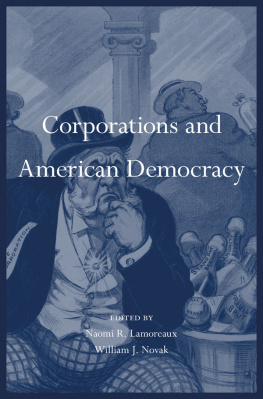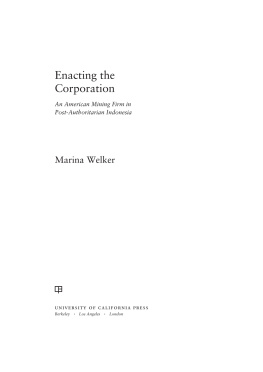Joel Bakan - The New Corporation: How Good Corporations Are Bad for Democracy
Here you can read online Joel Bakan - The New Corporation: How Good Corporations Are Bad for Democracy full text of the book (entire story) in english for free. Download pdf and epub, get meaning, cover and reviews about this ebook. year: 2020, publisher: Penguin Canada, genre: Politics. Description of the work, (preface) as well as reviews are available. Best literature library LitArk.com created for fans of good reading and offers a wide selection of genres:
Romance novel
Science fiction
Adventure
Detective
Science
History
Home and family
Prose
Art
Politics
Computer
Non-fiction
Religion
Business
Children
Humor
Choose a favorite category and find really read worthwhile books. Enjoy immersion in the world of imagination, feel the emotions of the characters or learn something new for yourself, make an fascinating discovery.
- Book:The New Corporation: How Good Corporations Are Bad for Democracy
- Author:
- Publisher:Penguin Canada
- Genre:
- Year:2020
- Rating:4 / 5
- Favourites:Add to favourites
- Your mark:
- 80
- 1
- 2
- 3
- 4
- 5
The New Corporation: How Good Corporations Are Bad for Democracy: summary, description and annotation
We offer to read an annotation, description, summary or preface (depends on what the author of the book "The New Corporation: How Good Corporations Are Bad for Democracy" wrote himself). If you haven't found the necessary information about the book — write in the comments, we will try to find it.
Joel Bakan: author's other books
Who wrote The New Corporation: How Good Corporations Are Bad for Democracy? Find out the surname, the name of the author of the book and a list of all author's works by series.
The New Corporation: How Good Corporations Are Bad for Democracy — read online for free the complete book (whole text) full work
Below is the text of the book, divided by pages. System saving the place of the last page read, allows you to conveniently read the book "The New Corporation: How Good Corporations Are Bad for Democracy" online for free, without having to search again every time where you left off. Put a bookmark, and you can go to the page where you finished reading at any time.
Font size:
Interval:
Bookmark:
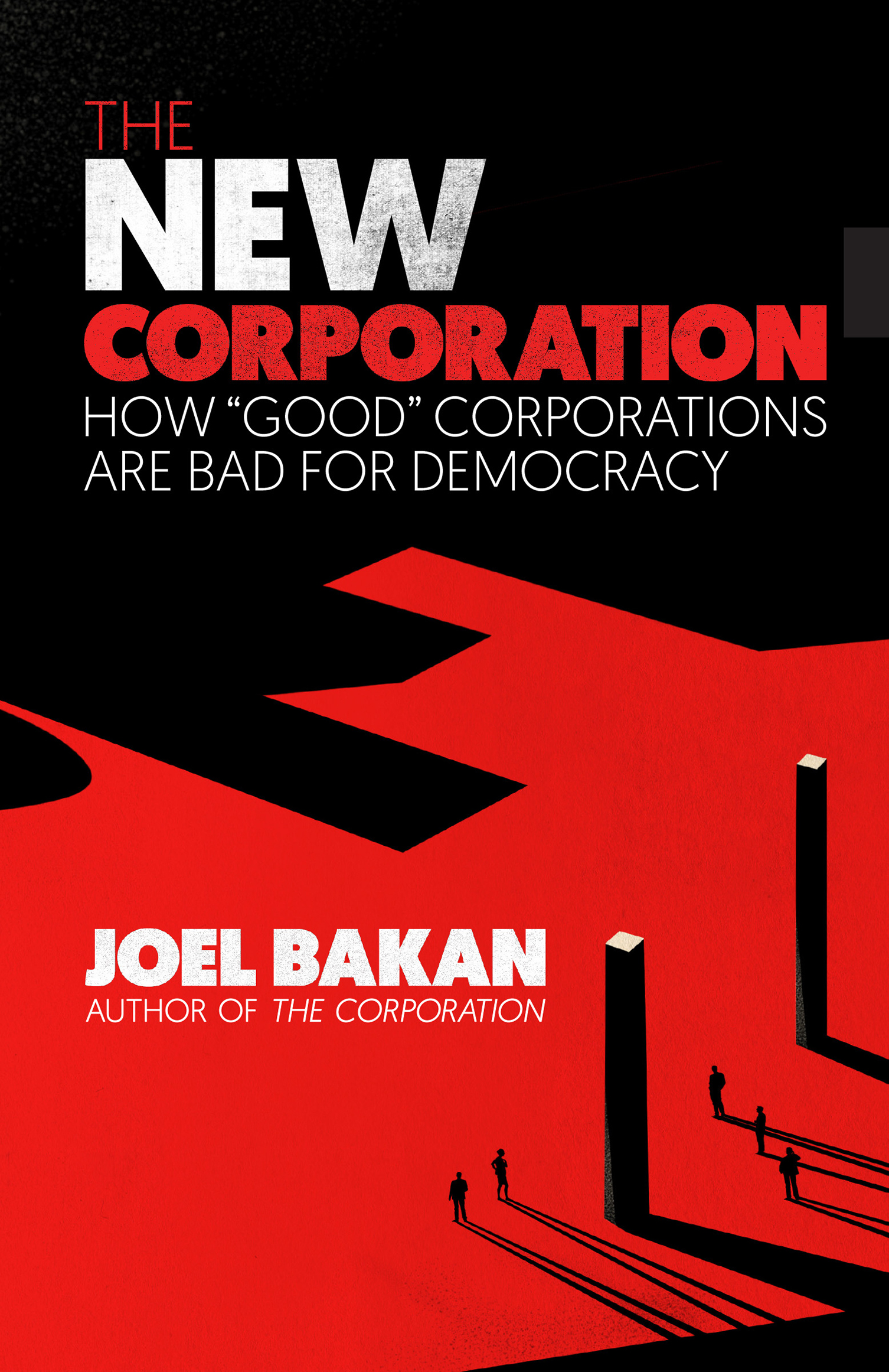
Joel Bakan is a professor of law at the University of British Columbia. A Rhodes scholar and former law clerk to Chief Justice Brian Dickson of the Supreme Court of Canada, he holds law degrees from Oxford, Harvard, and Dalhousie Universities. An internationally renowned legal authority, Bakan has written widely on law and its social and economic impact. He is the cocreator and writer of a documentary film and television miniseries titled The Corporation, which is based on his book of the same name. He also wrote and directed the documentary film The New Corporation, which is based on this book.
Just Words: Constitutional Rights
and Social Wrongs
The Corporation:
The Pathological Pursuit of Profit and Power
Childhood Under Siege:
How Big Business Targets Your Children
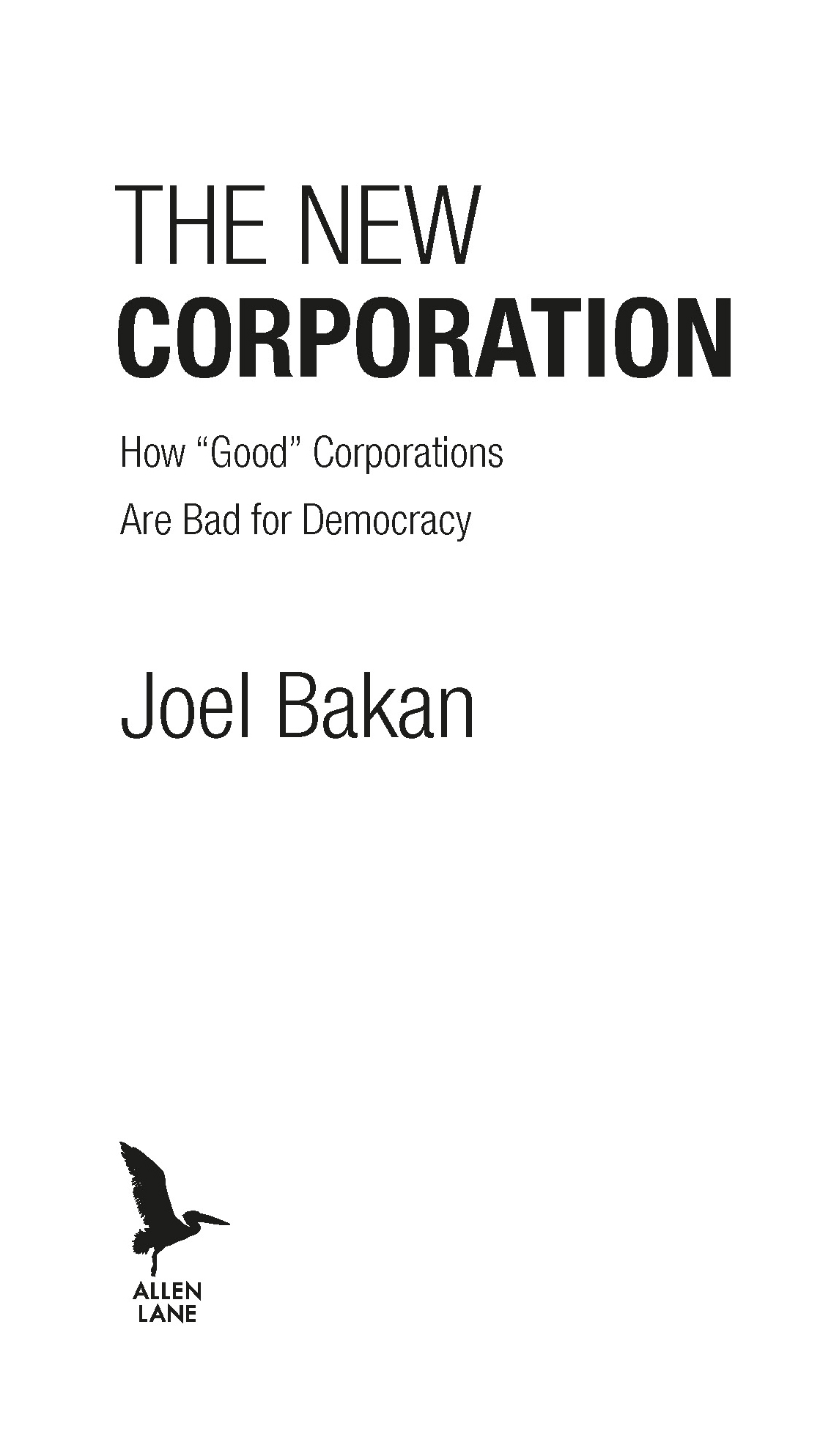
ALLEN LANE
an imprint of Penguin Canada,
a division of Penguin Random House Canada Limited
Canada USA UK Ireland Australia New Zealand India South Africa China
Published in Allen Lane paperback by Penguin Canada, 2020
Simultaneously published in the United States by Vintage Books,
a division of Penguin Random House LLC, New York
Copyright 2020 by Joel Bakan
All rights reserved. Without limiting the rights under copyright reserved above, no part of this publication may be reproduced, stored in or introduced into a retrieval system, or transmitted in any form or by any means (electronic, mechanical, photocopying, recording or otherwise), without the prior written permission of both the copyright owner and the above publisher of this book.
www.penguinrandomhouse.ca
LIBRARY AND ARCHIVES CANADA CATALOGUING IN PUBLICATION
Title: The new corporation : how good corporations are bad for democracy / Joel Bakan.
Names: Bakan, Joel, author.
Identifiers: Canadiana (print) 20190201096 | Canadiana (ebook) 2019020110X | ISBN 9780735238848 (softcover) | ISBN 9780735238855 (EPUB)
Subjects: LCSH: Corporations. | LCSH: CorporationsCorrupt practices. | LCSH: CorporationsMoral and ethical aspects. | LCSH: Social responsibility of business. | LCSH: Corporate governance.
Classification: LCC HD2731 .B35 2020 | DDC 306.3dc23
Book design by Christopher M. Zucker
Cover design by Bruce Alcock

ep_prh_5.6.0_c0_r0
For
Rebecca
Myim and Sadie
and Paul
with all my love
ON APRIL 19, 2019, the Business Roundtable, led by JPMorgan Chases Jamie Dimon and composed of more than two hundred of Americas top CEOs, heralded the dawn of a new age of corporate capitalism. Henceforth, the CEOs proclaimed, the purpose of publicly traded corporations would be to serve the interests not only of shareholders but also of workers, communities, and the environment. The declaration capped a two-decade-long trend of corporations claiming to be different, to have changed into caring and conscientious actorsready to lead the way in solving societys problems. I call it the new corporation movement. And for those within it who occupy the rarefied heights of elite corporate boardrooms, life has been good. For a twenty-year run, productivity was up. Profits were up. Stock prices broke records. Innovation seemed boundless. New ways to make money were discovered each day. And the rich kept getting richer. No doubt the coronavirus pandemic has tamped down the rise, and it may be awhile before corporations regain their full swagger. But they almost certainly willespecially as governments shower them with bailouts and infusions of cash.
Less certain are the fates of the vast majority of people in the United States and around the world whose lives became increasingly precarious as Wall Street soared and who, as a result, now suffer inordinately from the pandemic. Over the last two decades, workers wages stagnated, inequality spiraled, public servicesincluding health serviceswere shredded, good jobs and unions disappeared, and people worked harder for less pay and with less security (if they worked at all). Today, half of Americans cannot pay an unexpected four-hundred-dollar bill without selling something or going into debt, and millennials are the first generation in U.S. history to be worse off than their parents. Proper health care and housing are beyond the reach of many, and for the first time, mortality rates in the United States began rising in 2014. Opioids destroy lives and communities, and deaths of despair, from suicide and drugs and alcohol, are at all-time highs. Growing social division fuels hate and xenophobia, corrodes democracy, and enables the rise of demagogues, while climate change ravages the planet with ever-deadlier wildfires, floods, droughts, and hurricanes, heightening the risk of future pandemics, among other things.
Despite their claims to be ready to help, the new corporations cannot solve these global ills. But more important than thatand this is my central argumentthey are a large part of the reason things have gotten worse so dramatically and quickly over the last two decades. Indeed, the publicly traded corporation (hereinafter the corporation) never really changed, at least not fundamentally. It is the same psychopathic institution I diagnosed twenty years ago (in a book and a film, both called The Corporation). But it is more charming now. And it uses that new charm to convince us that its benevolent, that we can drop our guard and let it take control.
Casting themselves as good actors, corporations cajole governments to free them from regulations designed to protect public interests and citizens well-being, claiming they can be trusted to regulate themselves. They take over public serviceslike schools, water systems, and social services provisionsaying they will run them better and more efficiently than governments, and they push for tax cuts with promises of jobs and other societal benefits. The result? Governments retreat from governing, corporations take greater control, and we become a society that no longer has corporations but that is corporatethe reason, I claim, good corporations are bad for democracy.
Fortunately, there is a counterforce. Global resistance to corporate power and rule has surged over the last decade, an antidote to both the false hope of the new corporation and the growing sense of hopelessness pervasive in society. More and more, through rising protest and political action, people refuse to accept the hollowing out of democracy and the severe threat corporations pose to people and planet. It may be that the coronavirus pandemic is weakening corporations hold on society, as it lays bare the injustices and inadequacies of the current system, and fosters newly robust senses of community and democracy. Thats cause for hope, no matter the many reasons for despair.
ITS A COLD JANUARY NIGHT in Davos, high up in the Swiss Alps. Snow falls hard as Bibop Gresta, chair of Hyperloop Transportation Technologies, runs quickly down the towns main street, dancing nimbly among icy patches, trying not to slip and fall. Tuxedo clad and straining to see through fogged-up designer glasses, the forty-something entrepreneur is late for a party being hosted by JPMorgan Chase CEO Jamie Dimon and former British prime minister Tony Blair. Rumor has it Al Gore will be at the party (he is), and Canadian prime minister Justin Trudeau will show up (he doesnt). The usual coterie of business titans, high-tech entrepreneurs, and government and nongovernmental organization (NGO) officials will be there, networking boozily through the night, aglow with their own good fortune, champagne flowing and music booming. Welcome to Davos, the usually sleepy alpine village that transforms into a party hub for the global elite each January when the World Economic Forum (WEF) comes to town.
Font size:
Interval:
Bookmark:
Similar books «The New Corporation: How Good Corporations Are Bad for Democracy»
Look at similar books to The New Corporation: How Good Corporations Are Bad for Democracy. We have selected literature similar in name and meaning in the hope of providing readers with more options to find new, interesting, not yet read works.
Discussion, reviews of the book The New Corporation: How Good Corporations Are Bad for Democracy and just readers' own opinions. Leave your comments, write what you think about the work, its meaning or the main characters. Specify what exactly you liked and what you didn't like, and why you think so.

